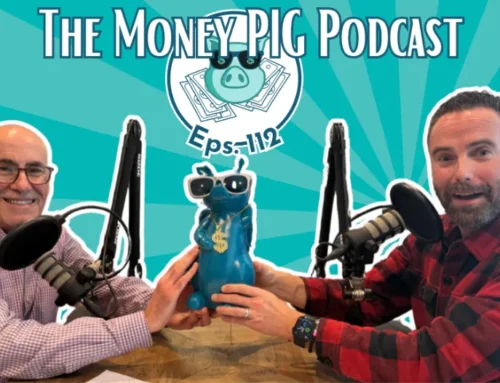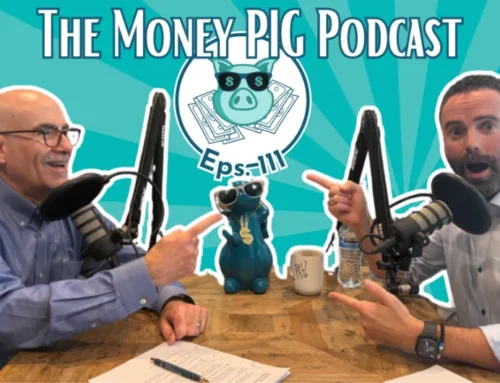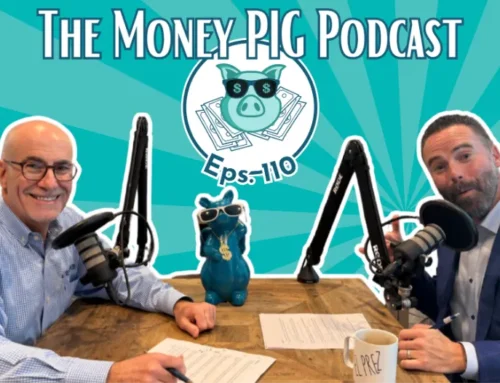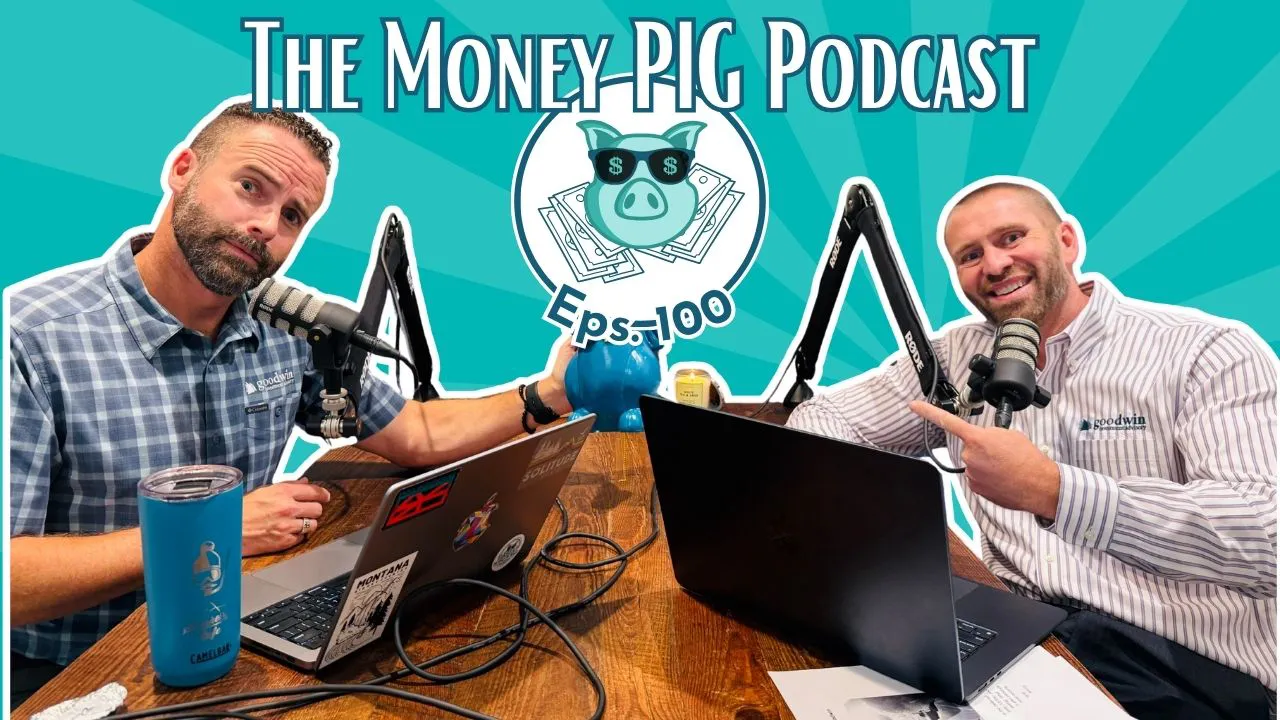
Link to YouTube – https://youtu.be/zdtJkZvNGxU
Link to BuzzSprout – https://www.buzzsprout.com/admin/2136084/episodes/17971001-episode-100-federal-employee-exit-strategy-w-justin-pitcock-cfp
Summary:
Early retirement offer? Whether you’re a federal employee offered a buyout or a corporate worker facing a severance package, the decision can be life-changing.
In this episode of The Money Pig Podcast, Tim Goodwin and Justin Pitcock share how to evaluate early retirement opportunities, reduce the anxiety of “what’s next,” and create a plan that gives you peace of mind.
They cover:
- The recent wave of federal employee early retirement offers (and what’s behind them)
- How to Evaluate your Pension, Healthcare, and Severance Before You Say Yes to early retirement
- Career 2.0 ideas—why part-time, purpose-driven work can boost retirement success
- Tax-smart strategies for severance packages and buyouts (timing is everything!)
- What to do with your TSP (Thrift Savings Plan) when you leave
- Why early planning with an advisor can mean retiring sooner—and with more
Whether you’re ready to hang it up or just want the option to, this episode will help you approach retirement decisions with clarity, strategy, and confidence.
Listen now and learn how to turn an unexpected offer into a purposeful next chapter.
Read the blog that inspired this episode and download the podcast: https://www.goodwininvestment.com/navigating-federal-workforce-transitions/
Like, subscribe, and leave us a review if this resonated with you!
Enjoy the episode?
Subscribe, share it, and leave us a review on Apple or Spotify!
For personalized financial guidance, schedule an intro call with our team at Goodwin Investment Advisory in Woodstock, Georgia. Our CFP® professionals can provide advice and help you navigate how to invest your wealth and plan for your retirement. We’d love to help you live out your legacy! To learn more about the benefits and services we offer click here.
Goodwin Investment Advisory is a Registered Investment Advisory firm regulated by the Securities and Exchange Commission in accordance and compliance with securities laws and regulations. Goodwin Investment Advisory does not render or offer to render personalized investment or tax advice through the Money PIG podcast. The information provided is for informational purposes only and does not constitute financial, tax, investment or legal advice.
*The following transcript of the podcast audio was software generated, and not reviewed for accuracy. Therefore the transcript below should not be used without verifying the validity and accuracy of its content. Please contact Goodwin Investment Advisory with any questions.
Transcript:
And welcome back to the money pig podcast. We’re super excited to have Justin Pickock Elmer Fudd here. How you doing today, Justin? Wonderful. Super excited to have you back. Have you been chasing any rascally rabbits lately? Man, those wasquey wabbits, they’ve been getting away all over the place. know, Mandy, who works with me, my assistant, she sends me a video this morning, a little fawn got like trapped in her fence and was like trying to get out to the mom in the morning, but it like messed up its nose trying to get out and all that stuff. So she literally like had called a friend that works with the DNR to be like, come get this fun so he can go see its mom. So yeah. Say if you touch them, then the mama’s not going to come, not going to claim it again. Oh, okay. Yeah. She, she didn’t try to touch it. She like opened the gate and all this stuff and it just won’t, won’t go out there. So, um, a quick story. Oh yeah. Let’s hear it. You’re supposed to share something interesting. look at that. Growing up, I had a pet deer.
His name was Fred. He was the coolest pet that like I’ve ever had. He, grew up with dogs. And so like whenever we had some Beagles at the time, and so there’s one particular Beagle named Missy and Fred Missy would go all over the place. They would go hunting rabbits together.
And the deer and the dog, deer and the dog. And, uh, so, you know, it was, and they were best friends. They’d, uh, cuddle up in the leaves, like bed down together, sleep together, went everywhere. Even, cause I’m a hunter. So even like during our dove hunts, the deer would be out there in the middle of the dove field. We’d be, you know, hunting, shooting guns and the deer would be right there with us. Didn’t care.
That’s wild. What do you like feed a deer inside? You go like grab some grass from the front yard or some hay like corn. Okay, so you’re feeding that inside or outside. The deer once it got big enough like we just let it roam free so it wasn’t like caged up. Okay, so all the neighbors knew it and walk into your house. have like a collar on it with a little tag that said red? It did, yeah. A big orange collar to hopefully
Tim Goodwin (02:35.308)
keep people from wanting to shoot it. Where’d he go? So what, mean, what happened? Did he eventually just go to the wild or? That’s the sad part of the story. somebody ended up shooting. man. And it was, gosh, so frustrating. Cause the, had a neighbor, we, we’re selling hay to and like, aren’t you all the one with the deer? I just wanted to let you know, like that their neighbor ended up shooting it.
Gosh. Super sad. Yeah, how long did you have that? Mr. Fred there? and a half years. Oh man. is a bummer. buck.
but you’d play with you just like a dog. He’d want you to push on his head and he’d kind of, right. That’s what I’m guessing is he just kind of thought he was a dog. I’d be mortified if I shot a deer and I go out there and it’s got like a collar on it and I would be, I just shot somebody’s back. a hunter, still like this was so frustrating. Man, I’m sorry to hear that. I don’t really know how to transition from that story to what we’re talking about to be honest. you know, but it is exciting to think about, you know,
retiring early, right? And so we were going to talk today about how federal employees have had some of those options over the past couple months this year. And so we thought we might talk about that. But before we do to try to just lighten the mood a little bit from losing Mr. Fred, I don’t know if you heard about the guy whose coffee was stolen. got mugged.
So bad. Jess is like, no, I to. That’s right on par. That’s what we need, that good dad joke comic relief to switch. So yeah, so helping federal employees, right? So they’ve had some of these options with a deferred resignation program, voluntary early retirement authority. I don’t know if you want to…
Tim Goodwin (04:27.894)
explain a little bit to the audience. Maybe they’re just listening because they love our stories and our dad jokes and they’re not veteran employees. Maybe just a little context for what those are. Yeah. Well, we’ll spare you like from going into the weeds, but a lot, a lot of folks have been offered the opportunity to retire early and a lot of people took that opportunity. And so there’s a lot of questions that come up, you know, gosh, can I retire? What do I do now? And that’s really where we come into play.
And so some folks got paid $25,000 to take this early severance package. Basically some of them are getting paid out through the end of the year. Some for some people, affects their pension. Some people it affects their healthcare benefits. So when you retire, you’ve got, you could have healthcare for life.
And we want to unpack all of those questions with our clients that were making this decision. if you’ve already, folks that have already made that decision, I think it’s like, okay, well, what’s next? Should I find another job at the end of the year if you’re collecting a paycheck to the end of the year, which I know a lot of people are? Am I good after that? And so we can model that in.
and help you have confidence in whatever that decision is, whether you feel like you’ve got enough, we’ll model it out. Here’s the upper threshold of what you could spend without having to worry about running out of money. then there’s things thinking through like…
what to do with your TSP. Yeah, exactly. And before we go into the TSP, I was looking up online, like how many federal employees had taken advantage of this deferred resignation program. So by the end of July 2025, 154,000 federal employees had accepted DRP bio offers. That’s like 6.7 % of the workforce. So this is a substantial thing folks have taken advantage of. But you made a really good point. If you’re listening or not a federal worker, like, why do I keep listening to this podcast? Well, a lot of times in the
Tim Goodwin (06:31.022)
corporate world you can be offered a buyout package, a severance, you know maybe they’re trying to cut the workforce or know help sweeten the deal to maybe get some folks to retire early and so there’s same kind of considerations for that person at that time then maybe some of these some of these folks have so
Yeah, so if you’re considering this offer, maybe you’re a federal employee or maybe you just work for a corporation and you’re kind of getting this offer to retire earlier than you were planning, what should I be thinking about? What should these folks be thinking about? think you need to understand the offer. Understand if you’ve got a pension, like a federal employee, how does that affect your pension? When can your pension start? Aspect, if you’ve got…
health care options, which federal employees do, state employees typically do. We need to know if that’s going to affect that health care benefit.
And then we need to model this out and figure out if it works for you. Do you need to, you know, find a career 2.0? Maybe it’s something that’s, uh, doesn’t pay as much, that’s less stressful, that you enjoy a whole lot. Right. And can make, you know, kind of this part-time gig where you’ve got freedom and you enjoy it. We’ll model out all these scenarios for you and help you figure out, you know, how all these pieces tie together and whether or not it works. That reminds me of something we’ve said for years about
definition of retirement, right? One of the dictionary definitions of retirement is to be put out of service, like retiring a baseball bat or jersey, right? We’ve really said, look, let’s redefine retirement as the option to pursue more meaningful work.
Tim Goodwin (08:15.094)
and maybe more meaningful work to you doesn’t really come with a big enough paycheck, right? So you’ve got this job that you’ve got now to make ends meet. But if that gets accelerated because of some kind of buyout or severance or whatever, just what you said, right Justin? You’re like, let’s look at career 2.0. What’s something that you could do? Maybe we’re not ready to retire. This moves the timetable up. Let’s go pursue some other kind of 2.0 career.
I think you and me and other advisors here would really try to guide our clients to looking at something more fun, more meaningful, more purposeful for them and not necessarily what pays you the most. That’s exactly right. And I’ve got several clients right now that are kind of in this transition. Some of them are federal employees. Some of them aren’t, but there was one that said, gosh, I want to go be a Pilates instructor. That’s not going to make a whole lot of money, but you’re to be in shape though.
But it’s what they love to do and it brings community, brings purpose and it brings in a little bit of money. And hey, when we model retirement plans for folks, something as small as just $10,000 a year makes a big difference in the sustainability of your retirement plans. so even if it’s being a Plottie’s instructor and making 10 grand a year, because you’re just teaching a couple of classes of whatever a week,
that can be, that can make a really big Yeah, it’s cool to see. I’m glad you brought that up because I’ve seen the same thing modeled out, right? Where a thousand dollars a month or something like ten thousand dollars a year can make such a big difference to a plan. glad you brought that up. Before we get to the exciting TSP question that you were alluding to earlier, let’s talk a little bit about taxes, right? So you are our kind of resident advisor tax expert most passionate about that topic when it comes to strategies involved with advising our clients.
So if we’re considering, if I’m considering or a listener or potential client’s considering an early retirement due to kind of a buyout package, what are some tax obligations they could be thinking about? Now, I don’t know that a federal employee is able to do this, but if you can spread out the timing of that income over… Right.
Tim Goodwin (10:31.278)
the current year and then get that payment the following year. bit there at the end of the year, or something at beginning of the next year. That makes a big difference. And so just think about the way our tax code works. It’s a progressive tax system. The more income you make, that additional dollar could be in a different tax bracket. And for example, with the passage of the new tax bill and the way it’s been for, gosh, over past 10 years.
It’s, um, it jumps from 24 % to 32%. So an 8 % difference. What if you were, if, if that severance package was going to be taxed at 32%, but you could get that payment in on January 1st.
next at 24, you just get an 8 % raise on your severance package. While you’re sitting there trying to negotiate your severance package, don’t shoot yourself in the foot by paying more taxes on it because you’re off by a couple weeks or a month or two. Timing matters. That’s great. That’s great advice. All right. So let’s circle back to the federal employee. You mentioned TSP. What is TSP? What does that mean for listeners that aren’t familiar with the TSP? It stands for Thrift Savings Plan, and it’s basically like a 401k. Okay. So if I’m a federal worker, or my 401k is called a TSB. TSB, that’s right. It’s a very simple retirement plan. It’s comprised of basically really low cost index funds, are, say, I mean, they’re very effective, but you don’t have a ton of flexibility and choices. So, when folks retire, if they do want help managing those assets, there’s a big opportunity to roll that out of the TSP. Now the investment universe is way, you know, much, much larger and we’re able to, implement different strategies where, you’ve just got a handful of index funds basically in the TSP and, know, you’ll get market returns.
Tim Goodwin (12:31.384)
But if you want to get a little fancier than that, you’ll need to roll it out of So what we’re typically seeing is folks that leave federal employment are typically rolling over their TSP to an IRA to have more investment options, access to more strategies. That’s correct. Okay, very cool. So you can have a Roth balance in the TSP and a tax deferred balance, just like a 401K. okay. Yeah. So the Roth obviously would go to a Roth IRA, the pre-tax would go to a rollover IRA.
Excellent. Okay. So let’s say somebody’s listening like, like, I’m not dealing with the severance package. I didn’t take an early buyout as a federal employee. Do I really even need to hire a financial advisor right now? What’s the advantage for them to talk to a financial advisor before that happens? So, I mean, one, I think there’s like an edge that we provide on investment management. So that’s, you know, number one.
Two is all the planning is knowing that you haven’t confidence in being able to retire. It’s thinking through tax strategy. There’s a ton of tax torpedoes. Right. Yeah. And in the tax code and let’s watch out for those. Watch out for the tax torpedoes. What that is is where certain credits or deductions get phased out and for an additional dollar of income, maybe because you retire and
and you’re pulling money from pre-tax versus Roth, and you could have optimized how much came from these different account types. If you pull too much out of the tax deferred, the pre-tax, that’s pushing up your income, and that could put you into one of these torpedoes. There’s social security torpedo, or your income’s over a certain threshold. That causes more of your social security income to also get taxed. And so it pushes you into actually pretty high marginal rates.
if you don’t know what to watch out for. You know, I love doing this research. Obviously, I’m a financial advisor. We’re financial advisors. Like, what difference are we making in the lives of clients? Now, we know that we can help on the peace side and the plan and the strategy, but you know, there’s a lot of research out there that shows working with a financial advisor does make a difference on the investment side of the portfolio too, over a long period of time.
Tim Goodwin (14:44.782)
You know, and there’s different studies around that and a different debate over it, but you know, some things talk about maybe a 3 % difference, right? Vanguard put out a study that basically says the advisor alpha, that just means like how much does an advisor on average help? And they’ve measured this through like 401k plans. Right. You know, all these 401k plan participants and the ones that work with financial advisors on average, they were saying,
had returns about 3 % better than those that didn’t. That’s where the study came It doesn’t sound like a lot, 3 % in one year, but when you compound a three-year increase over 10, 25, longer years, makes a huge difference. So when I’ve talked to folks, they’re like, look, if you can hire a financial advisor, and for us, I’m like, hey, if we can get clients before they retire, maybe instead of retiring with a million dollars, they can retire with two million dollars.
because we’re helping them with strategy or three million, there we go, I like it Justin, yeah. We’re looking at different strategies, we’re making hopefully better investments, maybe we’re looking at lower costs. So, little plug there, so whether you hire us or not, definitely worth considering trying to use a financial advisor earlier than later because it could make a really big difference for when that retirement is and what that retirement looks like. So as we wrap this up Justin, are there any final things that you wanna share about
this topic and then also share with the audience, what’s the first step if they want to, begin that conversation with us. Gosh. mean, for the folks that have, that I’ve been working with that have taken some of these early retirement options, there’s just a lot of anxiety out there that people are, people are scared. They don’t have job security and they feel like they could be on the chopping block next week. there’s, you know, meet, meet with an advisor.
let them help you put together a plan to help relieve some of that anxiety. Cause if you know that you’re, that you would be okay, gosh, you don’t have to worry about it. If you get the notice, you know, next week, you know that you’ll be okay anyways. That’s true. That can change a lot. Yeah. When you realize you’re working cause you want to not cause you have to, when you look at that, financial plan, yeah, that gives you a lot, a lot of peace. And then how can, how can
Tim Goodwin (17:07.874)
folks reach out and get started with us. go to our website, schedule an intro call. Let’s go. We love that schedule an intro call button in the top right. And there’s also, if you’re not ready to do that, that’s totally okay. We have a blog called Navigating Federal Workforce Transitions, How Goodwin Investment Advisory can support you. you can check out, you can find that blog if you’re subscribed to our blog already, you’ve probably got it somewhere in your inbox, you can search for it. If not, then you can go to goodwininvestment.com and click on the Knowledge Center and find it there.
So Justin, thank you so much for coming today. Love to kind of sign off the pod with gratitude. So we’d like to give a shout out to our producer, Angela, and our content creator, Tara, who are here off camera, but they’re doing a great job making us look and sound as good as possible. And I just, as I’m kind of thankful for the team putting this on, one thing that I’m really grateful for, we’ve got some job openings right now, and we’ve got a lot of folks that wanna work for our company, and I’m just grateful that we…
that I get to work for a company that has such great culture and that people actually want to work for, know, I think that’s really great. And I know not everybody really loves the culture they work for. So grateful for our culture here. We’ve got an awesome team. Yeah, that’s for sure. How about you? What are you grateful for lately? I’ve got an awesome group, like friends, you know, just like it.
The other night I was just thinking about this and just super grateful to have such a close group of friends that I could talk to and lean on that we encourage each other, support each other, and I realize that not everybody’s got that. That’s true. That’s a huge, huge difference. It’s like a whole different way to measure wealth, right? Yeah. As meaningful relationships surround you. So I’m glad that, I’m glad you had that. It makes a big difference. The listeners, thanks again for listening. If we can help you, let us know. Thanks for joining us. Have a great day. Bye-bye.
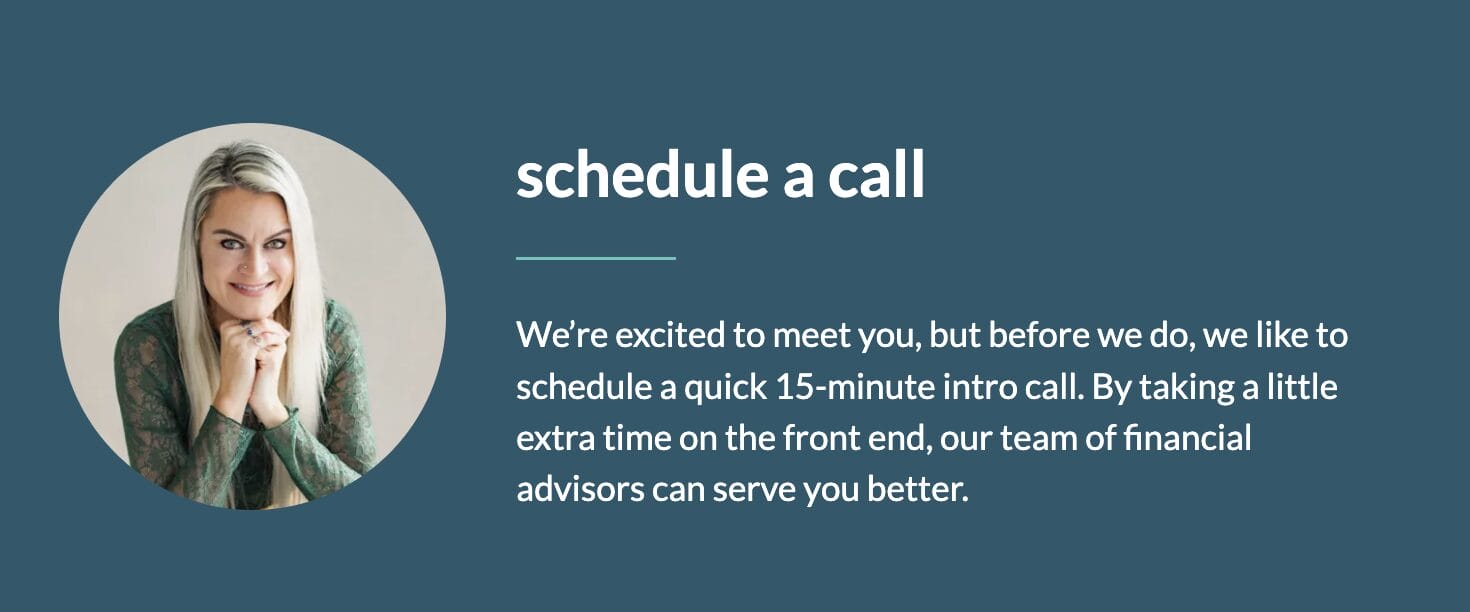
The Money PIG podcast is hosted by Reid Trego. Goodwin Investment Advisory is a Registered Investment Advisory firm regulated by the Securities and Exchange Commission in accordance and compliance with securities laws and regulations. Goodwin Investment Advisory does not render or offer to render personalized investment or tax advice through the Money PIG podcast. The information provided is for informational purposes only and does not constitute financial, tax, investment or legal advice.
For personalized financial guidance, schedule an schedule an intro call with our team at Goodwin Investment Advisory in Canton, GA . Our CFP® professionals can provide advice and help you navigate how to invest your wealth and plan for your retirement. We’d love to help you live out your legacy!
Goodwin Investment Advisory is a Registered Investment Advisory firm regulated by the Securities and Exchange Commission in accordance and compliance with securities laws and regulations. Goodwin Investment Advisory does not render or offer to render personalized investment or tax advice through the Money PIG podcast. The information provided is for informational purposes only and does not constitute financial, tax, investment or legal advice.

